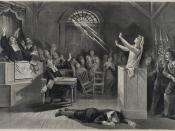Nathaniel Hawthorne's ancestors immigrated to the Massachusetts Bay Colony in
1630, and settled in the town of Salem. The history of Hawthorne's family in the town of
Salem would play a major role in his career as a writer as we will see with "Young
Goodman Brown."(Moss 421)
Nathaniel Hawthorne himself was born in Salem Massachusetts, in 1804. When
he was four years old Nathaniel's father, Captain Nathaniel Hathorne, died, causing the
family to lose touch with his fathers side of the family.(Waggoner 5) Hawthorne later
graduated from Bowdoin College in 1825 determined to become a writer. The drive to
become a writer caused him to spend the twelve years after graduation in a self-imposed
isolation on the third floor of his uncle's house. During the twelve years, he researched
the local New England history to use in his stories. In doing this he learned that his
ancestors on his fathers side, of whom he knew nothing, had been political and religious
Puritan leaders in Salem.(Waggoner
6) To understand the gravity of this discovery it
must be understood that during the mid to late sixteen hundreds were the now famous
Salem witch trials. The Puritan colonists in Salem during the sixteen hundreds
encountered a number of hardships, harsh winters, horrible taxes imposed on them by the
British colonial government, and an outbreak of smallpox. All of these things, combined
with their bloody encounters with nearby Indian tribes, could only be the work of the
"devil." Subsequently the term "witch", humans who do the devils work, was tossed
around all too loosely. When someone was deemed a witch and would not confess, the
result was always death. (Moss 421-422) It is believed that Hawthorne felt guilty
about the participation of his ancestors in the witch trials and his work reflected...


